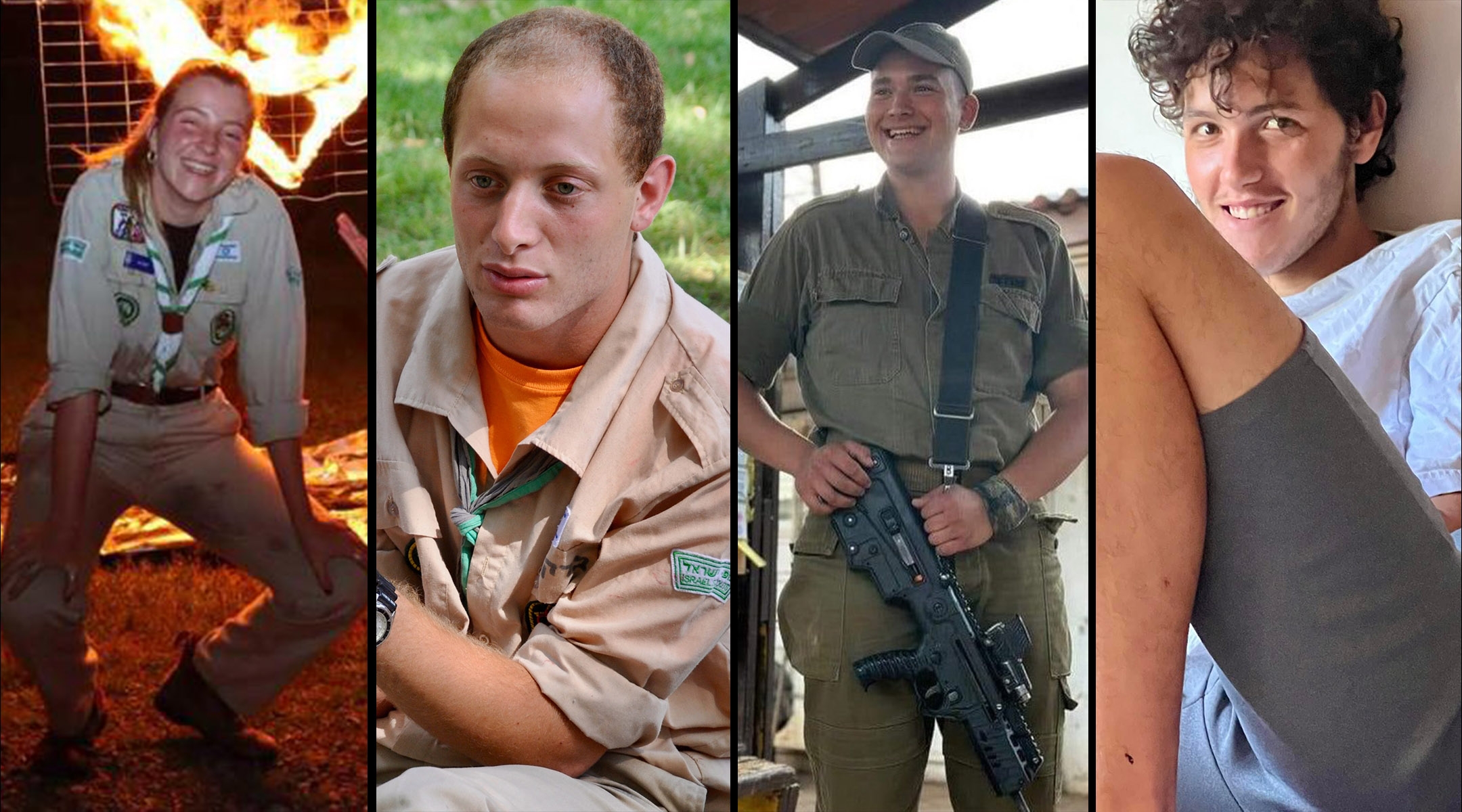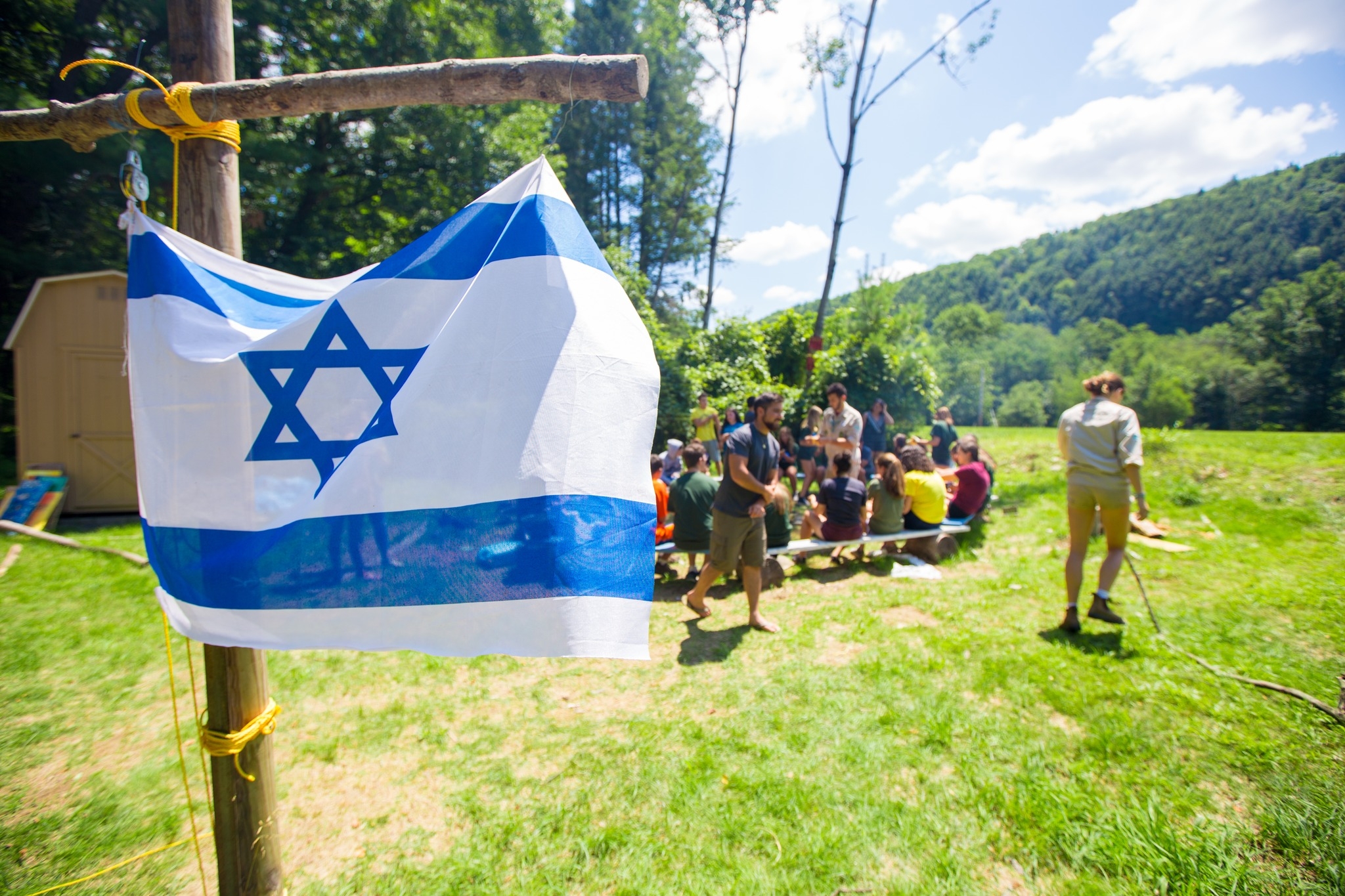‘Very much a family thing’: US Jewish summer camps mourn Israeli alumni killed in Hamas war
Four Israelis who spent time at Camp Tel Yehudah died on Oct. 7.

From left to right: Gili Adar, Yuval Halivni, Reem Betito and Laor Abromov. (Camp Tel Yehudah Facebook)
(JTA) — As news broke of Hamas’ surprise attack on Israel on Oct. 7, David Weinstein shared the grief and fear of many in the American Jewish community. But as the director of Camp Tel Yehudah, a Jewish summer camp in New York, the violence soon hit very close to home.
“Like everybody else, we were horrified and worried and scared and concerned about our people in Israel,” Weinstein told the Jewish Telegraphic Agency. “But it became very personal very quickly.”
Weinstein received a call that first morning that a former staff member, Gili Adar, was missing. He would later learn that Adar, 24, who worked at Tel Yehudah in 2019 and 2022 as part of its Israeli scouts program, was one of the more than 250 people killed at the Tribe of Nova music festival.
The devastating news didn’t end there. Three other Tel Yehudah community members were also killed: Yuval Halivni, who was a member of the camp’s Israeli scout delegation in 2012; Reem Betito, a camper in 2018 who served in the Israel Defense Forces’ elite Golani unit; and Laor Abromov, 20, who was a camper in 2019 and was also killed at the music festival.
“Much of that week, again, while keeping an eye on all of the bigger situation, and our concern for everybody, was really, really about the loss of part of our family,” Weinstein said.
Located in Barryville, New York, Tel Yehudah is the teen leadership camp of the Young Judaea network, a group of camps and youth programs specially designed to build connections between young Jews and Israel — including by having Israeli staff and campers at camp each summer.
As more details began to trickle out about the extent of the violence and loss in Israel, the wider Tel Yehudah community gathered, in person and online, to grieve and process together.
A Young Judaea virtual Havdalah service on Oct. 14 attracted around 700 people, Weinstein said, with breakout rooms that lasted for hours afterward. Staff and alumni also came together for a 20s and 30s Shabbat in New York City, as well as other informal gatherings.
“We have so many people over the years who went to Tel Yehudah who have moved to Israel, and are involved in so many important organizations and movements in Israel that people are very much in touch with,” Weinstein said. “Part of the Tel Yehudah family lives in Israel, and part of the Tel Yehudah family lives here. So it’s very much a family thing.”
Tel Yehuda was far from the only American Jewish summer camp to experience the deaths of past campers or staff on Oct. 7 in Israel, though it appears to have been the hardest hit. They may even have been especially vulnerable to loss because of their unique role as supercharged sites of interchange between U.S. and Israeli young adults.
“Israelis coming to camp has been a part of the American Jewish camping enterprise since the founding of the state,” said Sandra Fox, author of “The Jews of Summer: Summer Camp and Jewish Culture in Postwar America” and herself a Tel Yehudah alum.

Love for Israel is part of the program at Camp Tel Yehudah and other U.S. Jewish summer camps. (Courtesy Tel Yehudah)
Fox said the number of Israelis working at American Jewish camps increased after World War II and particularly in the 1960s and 70s, when air travel became more accessible and affordable. Fox said Tel Yehudah had Israeli staff as early as 1949.
While many synagogues and Jewish communities have Israeli emissaries — “shlichim” in Hebrew — through the Jewish Agency for Israel, Fox said the camp experience can be unique because it’s often younger Israelis, some who work at camp before their army service.
“This is an opportunity to meet more Israelis and create connections, with both campers and staff depending on which camp, and younger ones, so they can connect to people that are closer to their age,” Fox said. “The shlichim that come to the communities are usually young families. But a counselor could be pre-army or post-army, and if you’re a preteen or teenage camper, they’re a lot more relatable. So I think that that has a strong impact on the degree of connection they can make.”
A number of other Jewish camps around the United States are also mourning the loss of former staff and campers. The Ramah camping network has a page devoted to Israel on its website that lists two alumni who are among the more than 200 hostages being held by Hamas — Hersh Goldberg-Polin, who has also participated in programming with Camp Tel Noar in New Hampshire, and Omer Neutra, who also attended Young Judaea’s Sprout Lake camp before moving to Israel after high school.
The page also lists two family members of Ramah alumni who have been killed in the violence: Israeli swimmer Eden Nimri, 22, whose sister Hadar worked at Camp Ramah in the Berkshires in 2016 and 2017, and Adi Vital Kaploun, 33, whose mother is an alum of Camp Ramah in Canada.
Pinemere Camp in Stroudsburg, Pennsylvania, shared on Oct. 10 that 2022 staff member Ilay Nachman was killed. “His infectious laugh, caring nature, and love of Israel made him a pleasure to be around, and the type of role model both campers and staff could look up to,” the camp wrote in a Facebook post.
Herzl Camp in Webster, Wisconsin, shared that alum Netta Epstein, 21, was killed by Hamas in his home. Epstein attended Herzl from 2014 to 2016 and 2018, and his sister Rona also spent three summers there.
Yannai Kaminka, 20, who was reportedly among the first Israeli Defense Force soldiers killed in the attacks, had attended the Union for Reform Judaism’s Eisner Camp in Great Barrington, Massachusetts, in 2016 as part of a program with the Israel Movement for Reform and Progressive Judaism that brought Israeli teens to American Jewish summer camps.
Ruben Arquilevich, who oversees the URJ’s 14 camps, said the movement has around 350 Israeli staff across its camps each summer, adding that the relationships Israelis build with campers are long-lasting and “transformational.”
According to the Foundation for Jewish Camp, some camps have launched initiatives to support Israeli community members, including through letter-writing campaigns, sending care packages and offering virtual programming for children in Israel.
This article originally appeared on JTA.org.



















